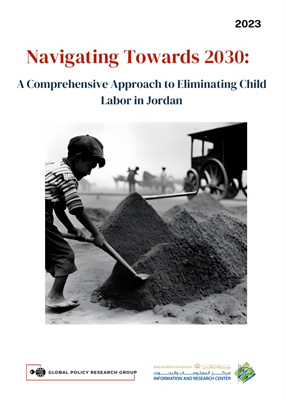You are here
Economic pressures perpetuate child labour, cycle of poverty — experts
By Rayya Al Muheisen - Aug 02,2023 - Last updated at Aug 02,2023
AMMAN — Despite being among the first countries to ratify international agreements aimed at protecting children from illegal exploitation of labour, children working in delivery services at coffee stalls in Jordan continue to be subjected to health risks, particularly in extreme weather, according to experts.
As Amman is still grappling with the persistent issue of child labour and young children can be seen working at coffee stalls all over the city, calls are rising to address root causes of the issue, which according to experts, are mostly economic in nature.
Legal framework
The Jordanian labour law explicitly prohibits the employment of children under the age of 16. It also places restrictions on minors working between the ages of 16 and 18, stating that they should not work for more than six hours a day and cannot work in hazardous conditions or subject themselves to danger of any kind in the workplace.
Employers found violating these laws face penalties, including a fine of JD500 if caught employing children. Despite these legal safeguards, the practice of child labour persists, highlighting the need for more rigorous enforcement measures.
Economist Hussam Ayesh told The Jordan Times that the prevalence of child labour in the capital can be attributed to several underlying factors, who noted that this phenomenon reflects the living conditions of many families in Amman.
"Unemployment rates have been on the rise, making it challenging for parents to provide for their families," he said.
According to Ayesh, the socioeconomic conditions in certain areas of Amman often force families into dire financial situations, causing some coffee shop owners to exploit the vulnerability of these families by offering extremely low wages to children.
"By hiring children, these businesses can cut down on labour costs, making it an attractive option for owners struggling to stay afloat in a competitive market," Ayesh said.
He highlighted the need for a comprehensive approach to tackle the issue. "Merely enforcing fines on businesses may not be enough," he said.
"The government should invest in creating more job opportunities for adults, particularly those from disadvantaged backgrounds, to reduce the economic pressures that push families to involve their children in the workforce," Ayesh added.
Moreover, the government should be urged to open summer camps, skills development centres and vocational training centres to invest in children and youth’s skills and future, said Ayesh.
Hussein Khuzai, a sociologist, emphasises the adverse effects of child labour on the psychological and emotional well-being of these young workers.
Khuzai pointed out that child labour can perpetuate a cycle of poverty, as illegally employed children miss out on educational opportunities that could otherwise uplift their socio-economic status.
"Children who work long hours at coffee stalls are likely to suffer from physical strain, mental stress, and reduced social interactions, hindering their overall growth and future prospects," Khuzai said.
To address the issue, Khuzai recommends a multi-pronged approach. "Apart from strict enforcement of labour laws, it is crucial to invest in awareness campaigns to educate parents and employers about the detrimental impact of child labour," he suggested.
Related Articles
AMMAN — As Jordan marks the World Day against Child Labour on Monday, experts across a variety of disciplines are calling for urgent c
AMMAN — Eliminating child labour requires a comprehensive approach that addresses its root causes by tackling poverty and increasing childre
AMMAN — Poverty, weak market regulation, gender roles, a lack of access to education and migration status are the main drivers of chil














